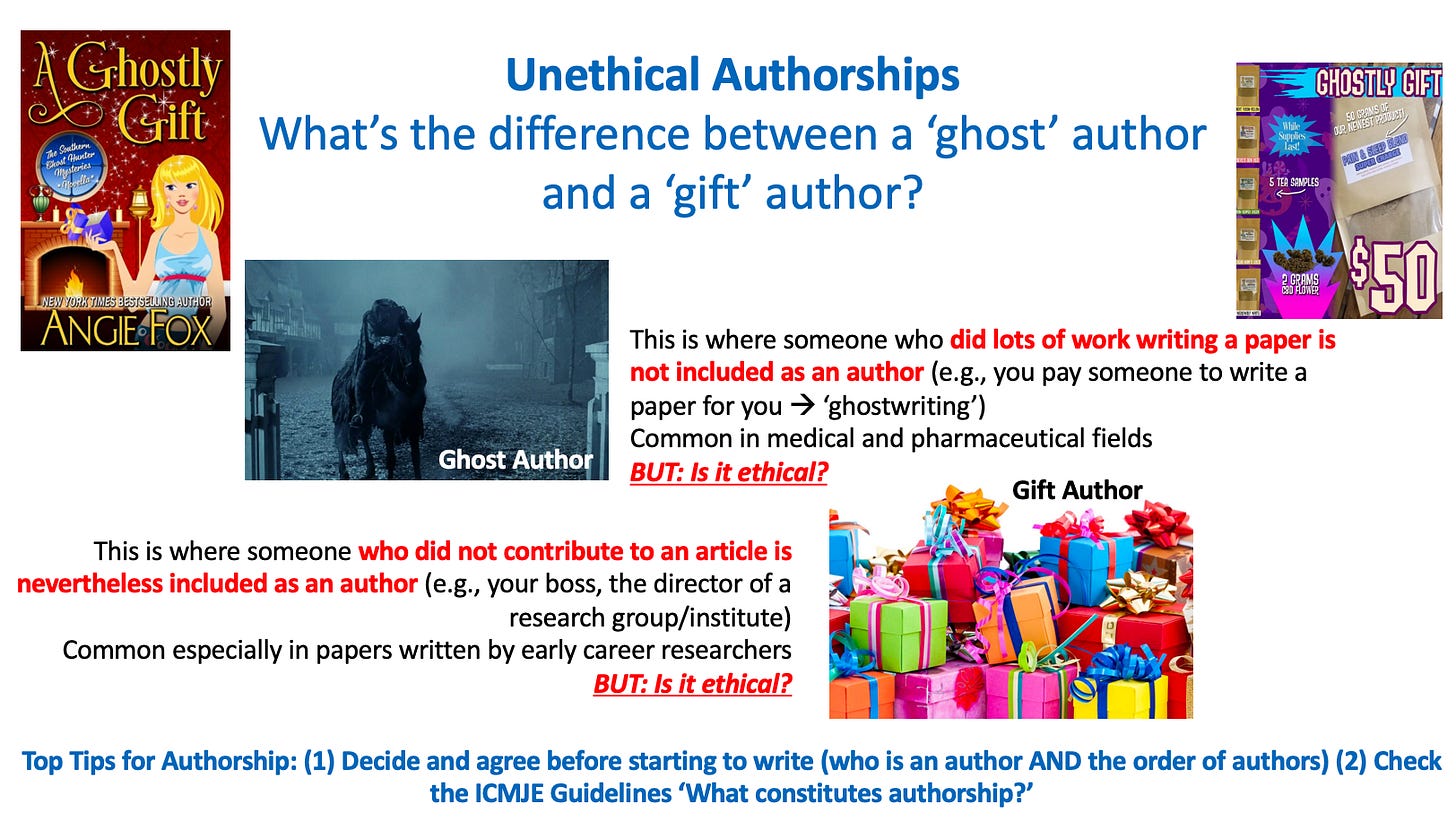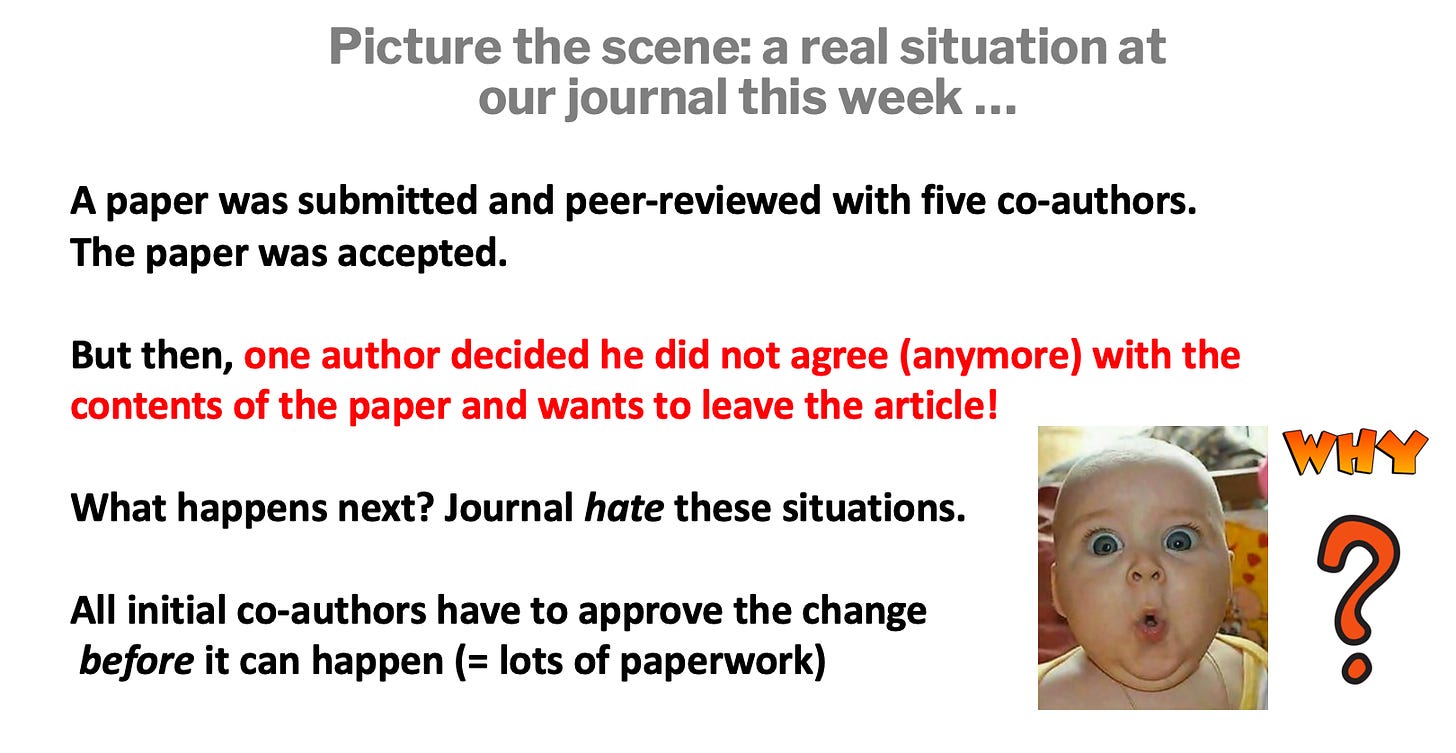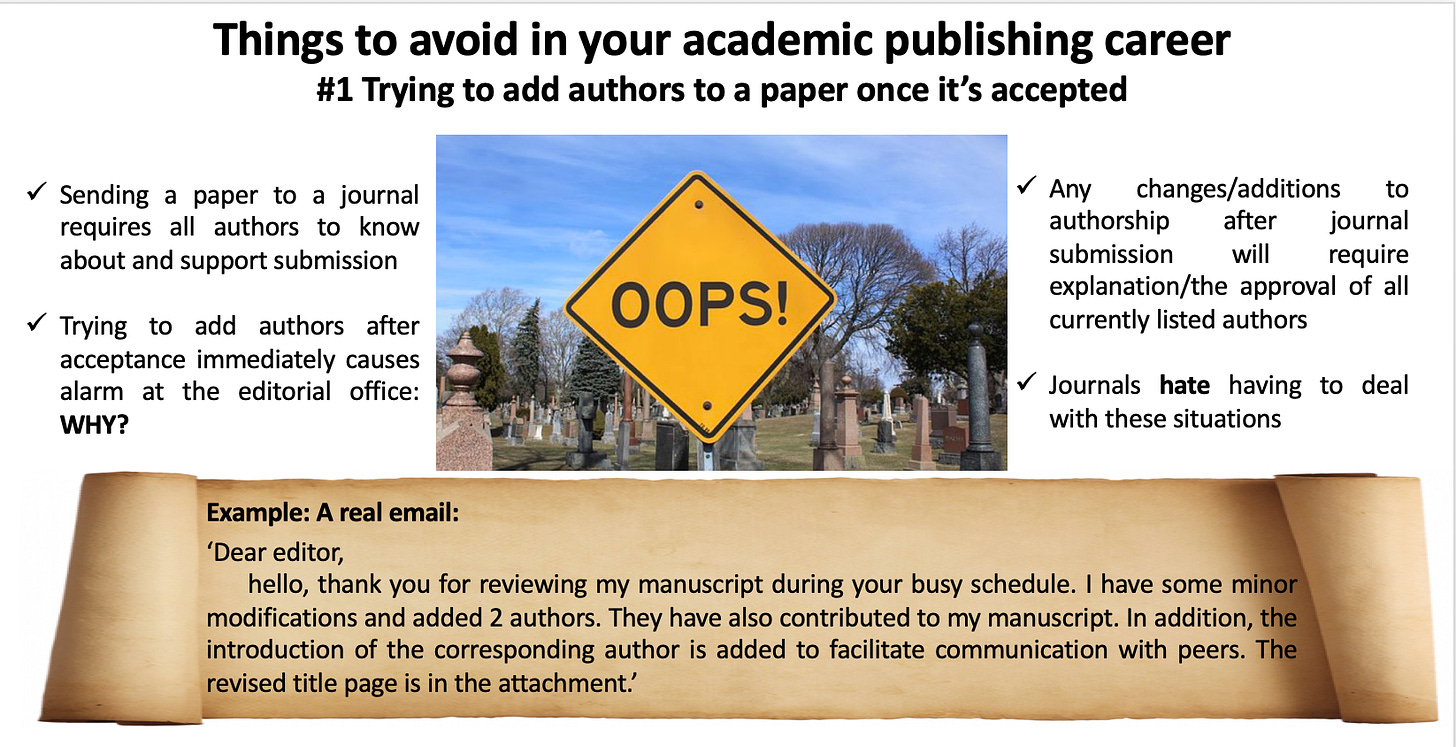Article authorship: Get your 'ducks in a row'
Authorship issues and fairness in academic writing: Some tips .....
One of the trickiest and most controversial aspects of academic publishing is deciding ‘who did what’ during research article writing. What does it mean to be listed as ‘an author’ on an academic paper? This aspect of academic publishing is one of the most open to abuse; most people are unaware of what ‘being an author’ actually means. The clue here is in the wording: to sign your name on a paper, to ‘be an author’, it’s necessary to have actually contributed to the creative writing process.
According to current guidelines you need to have added significant intellectual input during the process of actually putting the paper together. Not just winning the funding, or running the research group, or even performing the analyses.
Strictly speaking, if you look at article publishing guidelines (like those of the International Committee of Medical Journal Editors, for example, or those for individual academic journals), you’ll find a pretty standard definition for what constitutes authorship on an academic paper: ‘to qualify for authorship, a researcher must have been involved in drafting the work or revising it critically for important intellectual content’. This is quite different to what a lot of people think and, indeed, how they tend to behave: it’s not enough to just be involved in data collection, analysis, or funding to warrant article authorship.
Human nature though is to work based on incentives: I’ll scratch your back if you scratch mine. It’s no different in academic publishing.
Do researchers actually follow journal authorship guidelines?
Almost never, I’d argue. Indeed, flick through the pages of any academic journal: papers with multiple authors signed on them are norm. Did all these people actually contribute to the content writing? Again, almost never. Authorship, as currently defined by most journals, needs to be re-defined and we need to get real when it comes to publishing: deal-making around authorship is very, very common amongst academics, especially in fields were research is dependent on ‘access’, perhaps to field sites or samples. ‘If you give me access to this particular thing, then you’ll be listed as an author’. Is it sensible to limit ‘intellectual contributions’ to just the writing process? Many have argued, including in the most recent issue of Nature, that current authorship conventions enforced (or at least attempted to be enforced) by journals actually weaken the scientific enterprise. The current system is particular rough on early career researchers (ECRs) who very often do make very significant contributions to academic work (think: who does the data collection?) but then get buried within long lists of co-authors.
It’s becoming ever more clear that this situation has arisen because of a deep disconnect between the publishing industry and academia. Simply put: journal publishers just don’t understand how the research process works. Academic publishers (= journals) have tried hard to police ‘authorship abuse’ by introducing formatting requirements and systems during the writing and submission process that require people to state “their specific contributions” to an article. These systems are deeply ineffective; if I wanted to publish a paper with six co-authors, all of whom did very little during the creative writing process, I would just list them as having “contributed to the paper writing process” in a journal’s online system. No-one is going to check.
A story: Adding authors to a paper
I worked as a full-time university academic for 15 years or so and did fieldwork for my research in a number of different countries, including Morocco. We used to get funding from the Irish Government to collect fossils, like dinosaurs, in the Sahara Desert and I worked (and still collaborate) with a number of colleagues in this region. On one trip in 2006, we collected a number of dinosaur bones which we then did nothing with for several years; indeed, we have just completed a paper on some of these fossils which we wrote up and submitted to a leading Open Access journal. The paper went through two rounds of peer review (quite normal) and just last week my colleague, the lead author, received the final set of documents for final approval just before publication (it’s noteworthy that many journals, especially Open Access ones, don’t often provide ‘page proofs’ anymore, just a final text document and figures for author approval prior to almost immediate online publication).
We circulated the final versions of our paper amongst the four contributors to the study only to see one of our colleagues write to the group to ask for the addition of another author. ‘I’d like to add my colleague x, because he was very important when we did the fieldwork leading to the collection of these fossils back in 2006. We could not have done the project without him’, he wrote. Without putting too fine a point on it, this message causes a big problem; it’s very hard to add authors to studies once papers have been initially submitted to journals, let alone at such a late stage.
Journal submission requirements do vary on this point, but most are members of COPE, the Committee on Publication Ethics.
When making initial manuscript submissions, authors are almost always required to tick a box within an online system that verifies that ‘all contributors to the study have been included as authors’ and that ‘all authors are aware of this submission’, or similar. This procedure is intended to mean that everybody who deserves to be an author has been included on the paper at this stage and, of course, that they all know about, and have approved, the submission. Mistakes do happen, but it’s usually quite hard to ‘forget’ about the inclusion of an author on a research paper. As an editor, I do get occasional emails along these lines: ‘Dear Dr. Dyke, we forgot to include these authors on our paper when we made our initial submission’, but it’s very rare.
In these cases, the usual procedure is for a journal to ask for signed consent forms from all current co-authors approving the addition of a new colleague to the paper. This, of course, is a step taken to prevent a lead or corresponding author adding people late in the process without informing the current contributors. This can also happen, as people often view authorship on papers as a kind of ‘reward’ or ‘homage’, perhaps to senior colleagues. But it’s a step outside ethical publishing procedures: all authors listed on an academic research paper must have ‘contributed significantly’ to the study in question. I usually frame this in workshops by asking: ‘what did you do?’. Did you secure the funding for the research? Did you design the project? Did you collect the data or analyse it? Did you write the paper, or contribute to the manuscript?. These are all questions to ask yourself when considering whether, or not, to sign as an author on a research paper.
I’ve actually lost count of the number of times people have sent me manuscripts to edit and asked me ‘will you consider joining the paper as an author’ if you have time to work on the English? I always refuse these offers simply because editing papers is part of my job, and because I don’t consider that simply polishing someone else’s English warrants authorship. I often have little idea about the research underlying the manuscript; I’m just working to make sure it reads better to a native English speaker.
Another useful guide that I often share with students who are debating authorship on their own papers is ‘would you be happy to stand up at an international meeting and give a talk about this research?’. Because if the answer to this question is ‘no’ then you probably did not contribute significantly enough to the project to warrant authorship.
Back to our Moroccan story; we did write to the journal to try to accommodate the last minute request from our colleague, but I was not happy about it. This sort of thing just smells bad to me; why could my co-worker not have remember the name of this additional author earlier in the process? Adding someone now, once the paper has been accepted, just suggests that authorship is being gifted as some kind of reward or to return a favor. Although in this case, it is true that the colleague to be added did help a lot with the fieldwork at the time and therefore should probably have been an author. Next time though. We all agreed that the next time we write a paper about our fossil collections from Morocco we’d be sure that we agreed the full list of authors before starting.
Authorship on academic papers is one of the most difficult issues to resolve when disputes do occur. As an editor working for a major publishing company for more than a decade, I’ve seen a lot of things over the years: authors fighting amongst themselves once a paper has been accepted and demanding that it is removed from publication; authors demanding the removal of others prior to publication; researchers writing to us wanting to know why their name was not included as an author on a paper that has just come out when they collected a substantial amount of data; authors requesting that their names be removed from papers prior to publication because of a dispute with their colleagues. All of these situations have happened and had to be dealt with by the journal.
It would be far better if authors submitting their work for publications were aware of the ethical issues that surround authorship as well as the fact that changes are very hard to make once a paper has been submitted.
You share the collective responsibility for the submission of a manuscript to a journal, it’s contents (including data and analyses), and for any further issues and outcomes that might arise.







